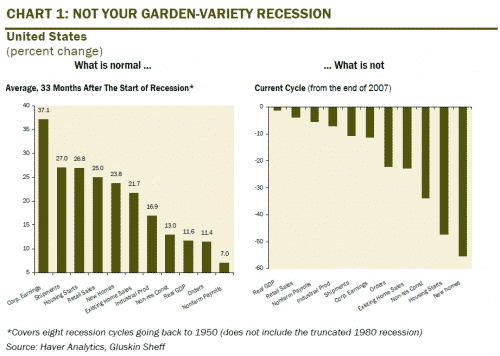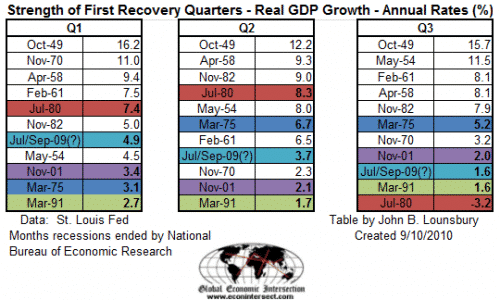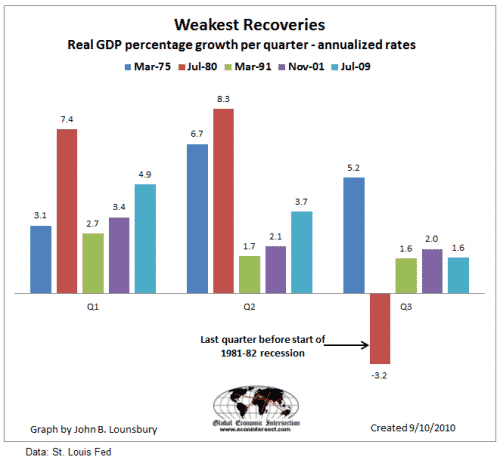Rosenberg: Not Your Average Recession
David Rosenberg, Chief Economist & Strategist at Gluskin Sheff, Toronto, has a graph that goes a long way toward explaining why this recovery does not feel like a recovery:
Click on images for larger graphs.
Is the reason that this doesn’t feel like a recovery because so many things have not recovered? Sure looks like it.
One factor that is followed to track recoveries from recessions is GDP. The weakest GDP recoveries in the past 60+ years are shown in the next graph:
The 1980 recovery started strongly but morphed into the serious recession of 1981-82 four quarters after it ended. In the third quarter real GDP was already negative as the Paul Volker Fed ran interest rates up to double digits to choke off the high inflation brought on by soaring oil prices. The double whammy of high energy costs and high interest rates slammed the economy back into recession.
Note that even though real GDP growth was -3.2% in 2Q/1981, NBER (National Bureau of Economic Research) did not declare the recession officially started until the third quarter.
The relative strengths of the recoveries in real GPD are more obvious in the following graph:
The current recovery started more strongly than either of the two preceding recoveries that started 1Q/1991 and 4Q/2001. However, the GDP declines in those two recession were much shallower than in 2007-09 and were recovered by the end of the quarter in which the recession ended in 2001 and in the third quarter after the 1991 recession ended. After three quarters, the 2009-10 recovery still has not regained the real GDP losses of 2007-09.
In this discussion the assumption has been made that the NBER will call the end of the recession sometime in 3Q/2009. The NBER follows many metrics in addition to GDP. From the NBER procedure document:
A recession is a significant decline in economic activity spread across the economy, lasting more than a few months, normally visible in real GDP, real income, employment, industrial production, and wholesale-retail sales. A recession begins just after the economy reaches a peak of activity and ends as the economy reaches its trough.
In view of the poor recovery in many econometric factors it can not be considered a sure thing that the NBER will officially date the end of the recession in 3Q/2009. I had suggested based on employment data the recession might be dated to end as late as 1Q/2010. That was before the recent slowdown has raised questions of just how much of a recovery we are actually experiencing. The possibility that the recession has not yet ended is still on the table.



Comments are closed.